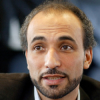Tariq Ramadan

Tariq Ramadan
Tariq Ramadanis a Swiss academic, philosopher and writer. He is the professor of Contemporary Islamic Studies in the Faculty of Oriental Studies at St Antony's College, Oxford and also teaches at the Oxford Faculty of Theology. He is a visiting professor at the Faculty of Islamic Studies, the Université Mundiapolisand several other universities around world. He is also a senior research fellow at Doshisha University. He is the director of the Research Centre of Islamic Legislation and Ethics, based in...
NationalitySwiss
ProfessionWriter
Date of Birth26 August 1962
CountrySwitzerland
No one can deny that some Islamist groups have credential and popularity. But that does not mean they are a majority. If we are serious about democracy we cannot blame the people for choosing what they want. We must promote the kinds of procedures and processes that are helping the people move ahead.
It is important that the Muslim leaders, scholars, and intellectuals are much more vocal and explain what Islam is.
The media is putting a lot of emphasis on the few people that are destroying, while it won't report on the silent majority of people who are constructing, building and trying to find their way.
You cannot limit the debate to being solely in favour or against. It should be more complex. When you condemn, you need to understand what led to it. In general, if it is our responsibility to condemn terrorist actions after they had happened, we have an even greater responsibility beforehand to make sure they won't happen.
I'd say that the modern social sciences are just showing us why the conditions for implementing Hudud are so demanding, and thus Hudud should only be for the absolutely last resort.
I don't think we should take the emotional reactions of a few people as more representative than those of the millions of people who took to the street in a non-violent way against dictators.
I had no intention to cover my tracks since I am not a politician and I do not represent anybody.
Part of the French political class is realising that there is are large number of Muslim people coming from the ghettos who want to make themselves heard, politically, especially about foreign policy issues. Its electoral weight can bring back to the forefront the Palestinian issue.
Those organisations, al-Qaeda being the first one, have all settled in areas full of mining and oil resources or in geostrategic zones. They settled in Afghanistan which underground is filled with oil and lithium. North Mali is filled with mining resources (uranium). It is essential to question the impact and role of some international players that create or let those organisations settle there.
In 2012, those French Muslim people voted massively for Francois Hollande against Nicolas Sarkozy. With the results of elections getting even tighter, those votes can make the difference. I am obviously not in favour of a "community electorate," however, pressure is so great on them that I can easily understand how it can affect their votes.
IS [Islamic State] has played a major role in helping Bashar al-Assad to reposition Syria on the international scene. Now, it is almost impossible to come up with a solution that would exclude him. The political game appears to be very cynical indeed.
Muslim societies must leave behind these dual aspects: secularism/Islamism.
Shaking up whole region means that Israel needs the US for its safety and military camps are "flourishing" everywhere in the Middle East. It has been said that [Barack] Obama is less interested in the Middle East. I don't think so. This mess has been created and maintained. Maybe the US is pretending to be less interested, however, it allows them to take their power back when it comes to security.
How can someone like Alain Juppé still claim I haven't condemned the Paris and Brussels attacks, when I actually have. What I am saying is crystal clear.